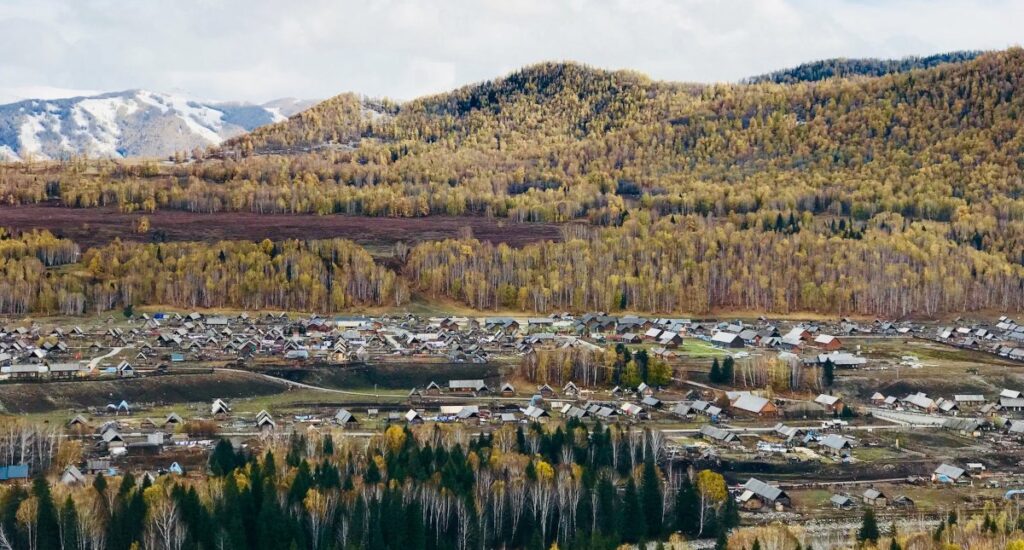Investigative Report Links Spotify Carbon Credits Purchase to Forced Labor Camps in China


Xinjiang, China. Photo Credit: Darmau
A new investigative report has linked a Spotify carbon credits purchase to forced labor camps in Xinjiang, China.
Spotify’s possible connection to alleged forced labor, referring specifically to labor performed by Uyghur Muslims in the mentioned city, emerged in an in-depth piece from the Guardian today. The Chinese government’s genocide of Uyghurs – including but not limited to arbitrary detainment sentences, “reeducation” programs, and the aforesaid forced labor – has long made headlines.
Meanwhile, a Zurich-headquartered company called South Pole sells carbon credits that purportedly afford “businesses a way to support transparent and high-impact climate action worldwide” by offsetting their emissions via various environmental initiatives, according to its website.
Last month, South Pole was the subject of a far-from-flattering New Yorker investigative report entitled “The Great Cash-for-Carbon Hustle,” which maintained, among other things, that “the market’s largest firm sold millions of credits for carbon reductions that weren’t real.” On the heels of the detailed piece, South Pole’s CEO stepped down this past Friday.
Bearing in mind these pertinent background details, the Guardian pointed to a “Bachu carbon project” that reportedly centered “on a biomass power plant in Xinjiang, China.”
And according to the same multifaceted account as well as research from the Netherlands’ Follow the Money, South Pole’s alleged deception may have also extended to the Bachu power plant. In particular, South Pole had originally indicated that the program would create income streams for “‘local farmers who collect cotton stalks and burn them to generate carbon neutral power.’”
But the Guardian and Follow the Money identified “potentially coercive labour transfers,” reportedly involving “hundreds of people” near the project. South Pole itself is said to have ceased selling the credits (after first making them available to clients in 2014) following “due diligence concerns” raised in 2021.
Before then, though, Spotify was reportedly among the entities (besides the World Wildlife Fund, BP, Hilton, and others) that purchased some of the inherently questionable Bachu project credits. The music streaming giant reportedly withdrew support in 2020.
Academic Adrian Zenz, widely considered one of the foremost experts on the Chinese government’s abuse of Uyghurs in Xinjiang, pinpointed evidence of two over decade-old forced labor farms directly within the Bachu project’s vicinity.
“Really, the biggest question is: How could the world’s largest carbon consultancy, focusing on *ethical* business, think that you could do anything ethical in the core region of an ongoing genocide?” Zenz spelled out on Twitter/X today. “There is something fundamentally wrong with the global corporate system.”
At the time of this writing, Spotify didn’t appear to have commented publicly on its reported participation in a carbon credits scheme that relied upon forced labor. However, South Pole claimed it’d “‘never owned or managed this project on the ground,’” with the point having purportedly inhibited its “‘ability to gather real-time and granular information.’”
Link to the source article – https://www.digitalmusicnews.com/2023/11/13/spotify-carbon-credits-south-pole-report/
Recommended for you
-
Marathon SE350 AVR | 100% Original | 2 Year International Warranty | Official Marathon Distributor | Marathon P/N 761594-01 | 100% Made in USA
$574,99 Buy From Amazon -
1pc B Flat Bugle Call Trumpet Cavalry Horn Emergency Bugle Cavalry Trumpet with Mouthpiece for School Band
$22,55 Buy From Amazon -
Handmade Wooden & Leather Classical Indian Folk Dumroo Damroo Damaru Hand Drum Set Percussion Decorative Collectible Showpiece World Musical Instruments (Brown)
$11,39 Buy From Amazon -
Electronic Drum Set Potable Drum Set Volume Control Electric Drum Set MIDI Drum Pad with 2 Built-in Stereo Speakers Foot Pedals, Sticks Christmas& Birthday Gift Can Record Tracks (Drum Songs Included)
$58,89 Buy From Amazon -
Donner 6 Inch Guitar Patch Cable Guitar Effect Pedal Cables Black 6 Pack
$17,99 Buy From Amazon -
AKAI Professional MPK Mini MK3 – 25 Key USB MIDI Keyboard Controller With 8 Backlit Drum Pads, 8 Knobs and Music Production Software Included
$99,00 Buy From Amazon -
AUGLEAP Electronic Drum Set for Kids, Roll Up Practice Pad, Electric Drum Kit with Headphone, Foot Pedals and Drumsticks, Gift for Children Beginners Age 5-14
$49,99 Buy From Amazon -
MAYBESTA Professional Wireless Lavalier Lapel Microphone for iPhone, iPad – Cordless Omnidirectional Condenser Recording Mic for Interview Video Podcast Vlog YouTube
$25,99 Buy From Amazon













Responses